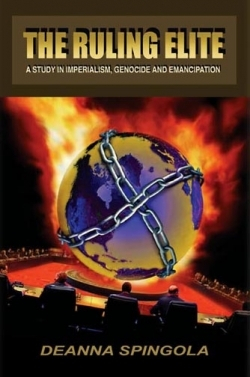The Ruling Elite
A Study in Imperialism, Genocide, and Emancipation
For those whose exposure to the story of America is limited to sanitized high school textbooks and obligatory college freshman survey courses, the tale of greed, corruption, manipulation, malfeasance, and mass murder woven by Deanna Spingola will be a revelation – and a shocking and unsettling one at that. Those whose knowledge and study of history has taken them beyond the cursory, however, will find little here they did not already have some inkling of. Empires, even this great one, as students of history are aware, are not pretty; they are conceived in horror and built in blood.
Spingola focuses her review of American history on the actions of that grim handful of rich, powerful, determined, and, in her view, thoroughly heartless and immoral families that ran, and, in many cases, continue to run the banks and corporations and government of the United States. This Ruling Elite includes Freemasons, the Illuminati, the Left (and Right) Hegelians, a cabal of Jewish bankers, the Skull and Bones, and many other shadowy societies.
There are few heroes in Spingola’s version of history. Icons of the Left and Right, of the North and South, and of the past and the present are equally vilified as “verifiably corrupt.” These are “unscrupulous characters,” she says, capable of exploiting even those few “sincere individuals seeking to assist the poor and the downtrodden.”
Some may dismiss the book as a catalogue of conspiracy theories. Others may spurn it as a rant of a bleeding heart lamenting the injustices done to indigenous peoples, minorities, and the poor. While cynics can easily find ammunition for those arguments among the 650 pages and nearly 2,000 footnotes and citations of Spingola’s weighty tome, in doing so each would do a great disservice, not only to the author but also to the study of history.
Traditionally, it is the victors who write history. Spingola tells the American story from the victim’s point of view. Nowhere is this more evident – or likely to be more controversial – than in her section on Abraham Lincoln. In terminology and passions mirroring those of Jefferson Davis and John Wilkes Booth, Spingola views Lincoln as a despot, a “Machiavellian” tyrant, and a perpetrator of mass murder. “Lincoln’s War,” as Spingola uses a very dated Southern convention to describe it, was “a watershed event” and the “turning point” in American history, but not in the positive sense as seen by most other historians and Americans.
“The Union’s victory destroyed the right of secession,” believes Spingola, quoting Britain’s Lord Action, and in weakening the states removed that last “available check on the absolutism of the sovereign will.” Spingola makes a case that Lincoln could have avoided war but that neither he nor the Ruling Elite behind him wished to do so. They saw war as necessary, says Spingola, for America to evolve from a loose collection of semi-independent, co-equal states into a corporate federal banking empire.
While these arguments have been made before – and Spingola cites many of those who have done so in her wealth of footnotes and citations – most were put forward by apologists for the Confederacy. Spingola, though she admits her Southern roots, has little good to say of the “Southern scoundrels,” the brutal slave-owning aristocrats who also shared responsibility for plunging the nation into what one Georgia newspaper of the time called “a rich man’s war and a poor man’s fight.”
Spingola does not so much expose as embellish the story of those “hidden forces,” as she calls them, that “choreograph chaos” for their own enrichment. “Power does not always corrupt,” as she notes, but it is almost always the case that “corrupt individuals seek power.” As she sees the story of America, it is the rest of us who paid and continue to pay the price of the ambitions of this Ruling Elite.
Reviewed by
Mark G. McLaughlin
Disclosure: This article is not an endorsement, but a review. The publisher of this book provided free copies of the book and paid a small fee to have their book reviewed by a professional reviewer. Foreword Reviews and Clarion Reviews make no guarantee that the publisher will receive a positive review. Foreword Magazine, Inc. is disclosing this in accordance with the Federal Trade Commission’s 16 CFR, Part 255.

